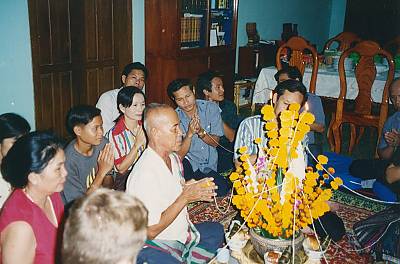- Lao People's Democratic Republic, Thailand

Baci Su Kwan Ceremony in Lao People's Democratic Republic and Thailand

© “Vientiane, baci ceremony (6172947454)” by Arian Zwegers is licensed underCC BY 2.0
1. ICH domains
Oral traditions and expressions, rituals, festive events
2. Short description
Practiced in Lao People’s Democratic Republic (PDR) and northeastern Thailand, Baci Su Kwan is a ceremony for invoking unity and restoring harmony of the individual and the community. Translated as ‘calling the soul’, Baci Su Kwan is organized for important rites of passage such as marriages, ordinations and the birth of a child, as well as for supporting physical and emotional recovery during an illness or after an accident. The ritual centres around an offering tray of food and other items, decorated with banana leaves and flowers symbolizing love and longevity, prepared by members of the community. A respected elder in the community — usually a former monk — recites Buddhist chants and mantras calling upon deities and spirits to help recover the soul of the individual or the community. White thread symbolizing peace, good health and community solidarity is tied around the right wrists of all the participants, and the ritual is followed by a shared meal.
Further information:
A description of the Baci Su Kwan ceremony can be found at the following link:
https://www.laos-guide-999.com/baci-ceremony.html
A community Baci Su Kwan ritual is featured at the end of the following video (5’57”) about the Lao New Year:
https://www.youtube.com/watch?v=xyKHP8qRDiM
3. Link with sustainable development
The Baci Su Kwan ceremony has both a restorative and constructive role in building peace in communities. Holding a Baci for an individual who has faced illness or emotional hardship is a means of harnessing support from the community to restore well-being and reintegrate the individual into society. Baci ceremonies held for important rites of passage reinforce a sense of collective identity and the value of harmony to the well-being of the community as a whole. The ritual is also vital for conflict resolution, as discussed in the following thesis:
Traditional conflict resolution processes: mediation and rituals to address conflicts in multi-ethnic cultures of Laos:
https://mspace.lib.umanitoba.ca/handle/1993/4762
More broadly, the ceremony echoes SDG 16, dedicated to the promotion of peaceful and inclusive societies.
4. Questions for reflection
The Baci Su Kwan ceremony continues to be practiced widely in Lao PDR and the north-eastern region of Thailand. In Laos in particular, the ritual has also been incorporated into tourism experiences, to welcome guests to homestays and hotels.
Do you think the incorporation into tourism experiences will further support or be a threat to the viability of the ritual and why?
Do you know of similar ceremonies that have employed successful strategies to ensure its viability? If so, what are some of them?